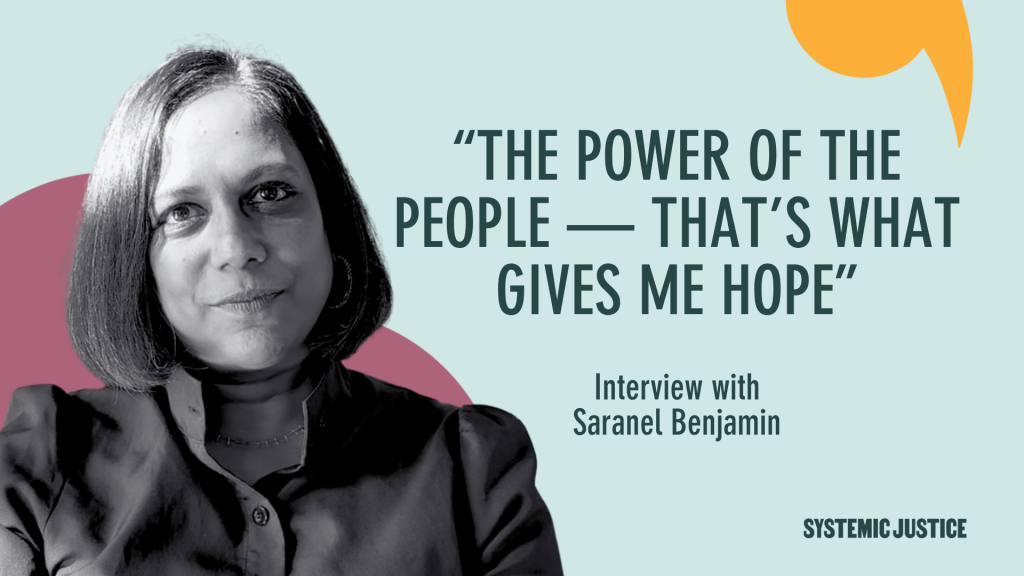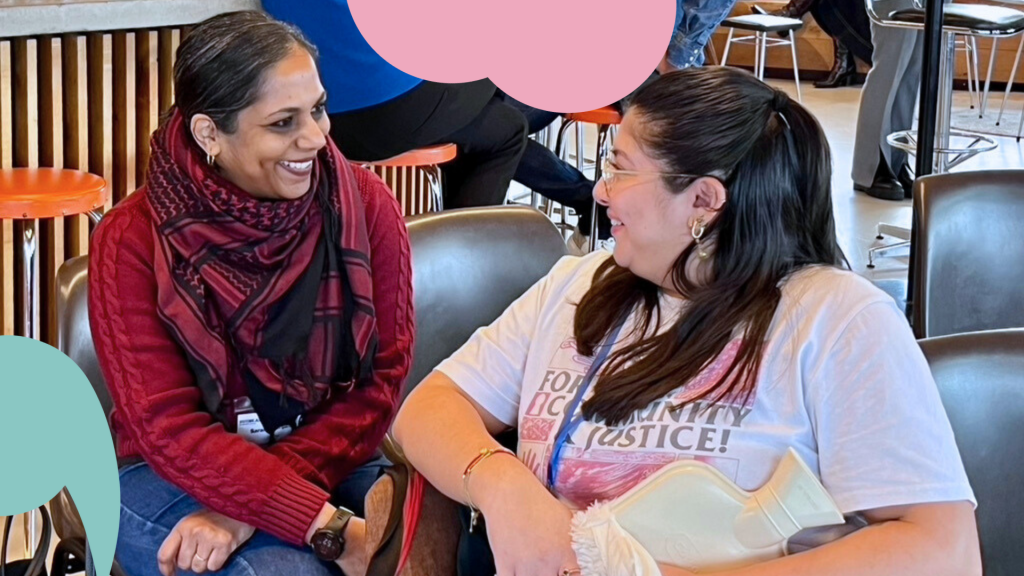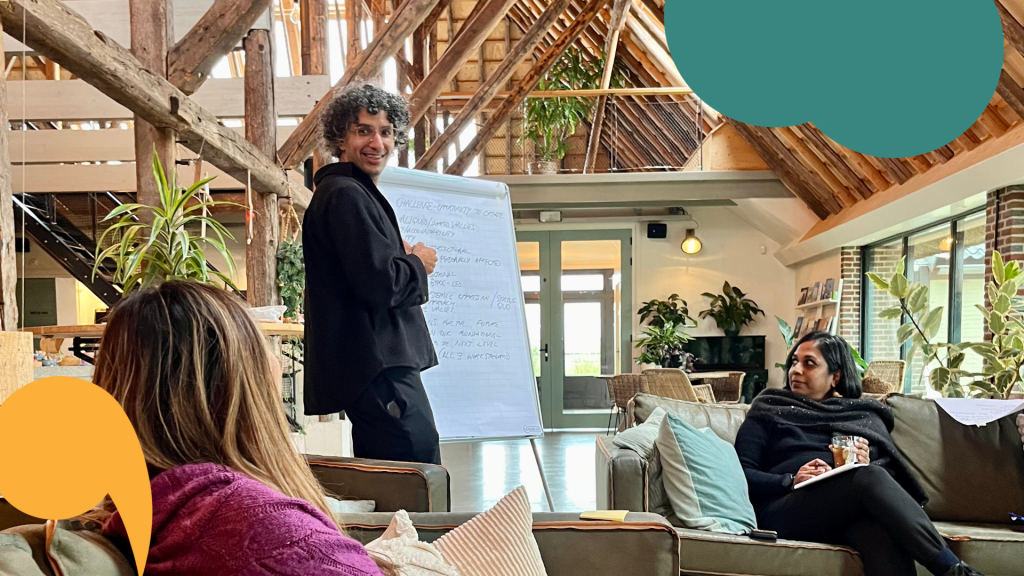
When Saranel Benjamin stepped into the role of the Executive Director at Systemic Justice, she brought with her a lifetime of decolonial activism, shaped by the lived experience in South Africa’s apartheid, leadership roles at Mama Cash and Oxfam GB, and a deep belief in the power of communities to create systemic change. We sat down to talk about her vision for the future of Systemic Justice, what justice means to her, and what keeps her hopeful.
Saranel, you’ve dedicated a lifetime fighting for justice in one form or another: as an executive leader, anti-racism feminist, and a long-time advocate for racial, social, and economic justice. What does justice mean to you?
Justice, to me, is about righting the systemic wrongs that perpetuate racial, social, and economic inequalities: harms that continue to disproportionately affect Black, Indigenous, and People of Colour (BIPOC). When we fight for justice, we are fighting for the liberation of BIPOC people through the dismantling of the intersecting systems of oppression. As Francesca Albanese, the UN Special Rapporteur for Palestine, says, “Justice wins when people rise, organise, unite, and move together.”
Was there a moment in your life that shaped your commitment to social justice?
I was born into and raised under apartheid in South Africa: I lived in a segregated township and went to a segregated school. My father recently reminded me that I was already protesting for equal rights at the age of eight.
My parents spoke openly about injustice from as early as I can remember, helping me see how Black African people were oppressed simply because of their race. So it wasn’t one defining moment — it was the environment I was born into, the courage I saw around me, and the lessons my parents taught me.
It sounds like your upbringing has played a big role in shaping that awareness. Who have been your biggest influence along the way?
I am constantly learning, and my learning shifts and evolves and is strengthened by the different people I meet, or the writers and thought leaders I am introduced to every day.
I do credit my parents for the strong foundations they built in me — they talked with me about apartheid openly from a very young age. When my mother wasn’t allowed to use a public toilet because of her race, we talked about it. When we had to go our racially designated beach, we talked about it. When my dad had to put his foot down and accelerate across the Orange Free State before it got dark, we talked about why he had to do that.
We sometimes disagreed enormously, and we all supported different anti-apartheid groups (I was part of the Black Consciousness movement), but there was always space in our home to debate, disagree, discuss, and learn about how we achieve justice in our lifetimes. I am very grateful to my parents for this.

Moving to your current work, what excites you most about leading Systemic Justice?
What makes Systemic Justice so exciting is that it is offering a different model to how strategic litigation can be done and still achieving the outcome of systemic change.
By centring organisations, movements, and collectives in the development of strategic litigation strategy and having them lead the strategic litigation, we are ensuring that those most affected are the ones leading the change that they want to see.
What is also transformative about this approach is that it emerges from strongly embedded founding principles of anti-oppression, intersectionality, and justice. Through taking a values driven community-led approach to strategic litigation, it enables the unequal power dynamics that exists in the litigation space to also be transformed.
Systemic Justice is also taking a movement building approach to strategic litigation, the impact of which lasts much longer and beyond the litigation itself.
What is your vision for the organisation for the next few years?
Nani Jansen Reventlow, the Founder of Systemic Justice, has built a solid foundation for the organisation. She has planted all the right seeds to achieve the vision of a world where communities have the power to use the courts on their own terms to secure racial, social, and economic justice.
My vision for the next few years is to ensure that Systemic Justice is a strong, stable, and resilient organisation that works with and is led by communities to bring about systemic change by making the law work for them. It is an exciting time as we work with community partners to bring cases to court.
Systemic Justice’s approach is quite distinctive. How do you see Systemic Justice’s role in supporting communities in their pursuit of change?
Our role remains as working side by side and being led by community-led and community facing organisations, movements, and collectives to develop strategic litigation strategies alongside their campaigns for racial, social, and economic justice.
We will continue to support them to build their capacity to use the law and courts to bring about long term, sustainable systemic change. And we want to continue working with the legal community to shift their practices to adopt a community-led approach to strategic litigation.
And what do you hope people feel when they encounter Systemic Justice’s work under your leadership?
I hope that people can feel the founding values of anti-oppression, intersectionality, and justice in and through our work. When I joined Systemic Justice, I immediately felt the deep connection between our origins, being founded and led by a Black woman, Nani Jansen Reventlow, and the way we approach everything we do as a majority BPOC team. Thanks to Nani’s values and principles, our commitment to being community-driven has become a defining part of who we are.
These values and principles are reflected throughout our work: in the resources we create, the approaches and methodologies we use in our workshops, and in how we partner with community-led and community-facing organisations. We meet them where they are, moving forward at their pace and according to their needs.
Intentionality, care, and deep respect are at the heart of our practice. I hope that people will continue to experience Systemic Justice in this way under my leadership.

The social justice landscape in Europe feels quite tense at the moment. What do you think are the biggest challenges facing social justice movements in Europe today?
Across Europe, space for social justice movements is shrinking. The far right is no longer confined to the margins — it now holds positions of power, supported by long-term funding and strong cross-border networks. This growing influence is making it increasingly difficult, and often riskier, to organise and defend fundamental rights, while discrimination and division continue to deepen.
At the same time, funding for social, gender, economic, and climate justice movements is becoming more limited and short-term. Yet it is these movements that play a crucial role in holding governments accountable and protecting hard-won rights. What they need are funders willing to act boldly to support work that is intersectional, cross-border, long-term, and flexible.
Despite the challenges, movements continue to organise. They still show up every day. They still organise locally to make sure their communities are safe and protected. They still come to workshops to learn about how the law can be used to bring about systemic change. The risk to not do this is so much greater. So even though the challenges seem insurmountable, hope lies in social justice movements and in the power of the people.
Speaking of hope — what gives you hope at the moment?
The power of the people. Every day we are seeing countless people taking action to defend democratic values. This is so important at this moment in time when we are witnessing multiple genocides being livestreamed on our phones. The fight for the liberation of Palestine has become the galvanising force of people’s power because we are seeing, through the way states are responding to it, that democratic values are under attack.
Despite misinformation and increasing restrictions on the right to protest, people continue to gather, speak out, and demand justice.
We have faced difficult times before — moments when democracy and human rights were under strain. History reminds us that change is possible.
Finally, how do you ground yourself in this work? What does a typical morning look like?
I can’t open my eyes without coffee! I normally wake up and stumble to the kitchen to get my cup of coffee, and stumble back to bed, where I will then write my morning pages. Every morning, I journal three pages — this is my mental download. I get to clear my head, get some insights, maybe even resolve some issues that I don’t need to carry into my day. Then I meditate for 15 minutes. That’s my morning ritual.
Note: This interview was originally published as a three-part video series on our social media. You can find these videos here.
